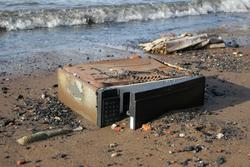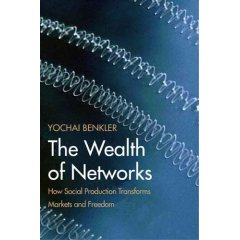Searching with Google yesterday, I smiled at its logo, playfully reworked to look like a Joan Miró painting in honor of the Spanish artist's birthday. His family and Artist's Rights Society weren't smiling, the Mercury News reported, asking Google to remove the tribute mid-day. Google honored the request while saying that the logo did not infringe.

[President of Artists Rights Society Theodore] Feder said the society receives hundreds of requests each day from media organizations who are interested in reproducing a copyrighted work in some form. He said the authorization process is simple: all Google needed to do was send an e-mail asking permission to use the images.
"We would have asked the estate or the family, and they would have said yes or no," he said.
But fair use, as U.S. courts recognize it, eliminates the need to ask permission. Fair use saves us from the sanitized world where only authorized tributes or commentary are permitted. Moral rights, applied in many European countries but not the U.S., protect the "integrity" of artists' works -- but even that was hardly under threat.
No one would think from this logo, which linked to a Google search for "Joan Miró," that the artist (who died in 1983) endorsed Google; instead, many more might have been inspired, as I was, to click through to some of the originals artworks whose elements were re-mixed here. Copyright prevents someone from making Miró lithographs without permission, it doesn't and shouldn't prevent Google from honoring artists before they're dead 70 years.
Enterprising Wikipedians have already added note of the controversy to the Miró biography.
 Boing Boing links the clever short film [ airport ], made entirely from the common airport direction and instruction symbols.
Boing Boing links the clever short film [ airport ], made entirely from the common airport direction and instruction symbols.
Also cool is the AIGA page where the design association makes all the symbols available in EPS and GIF formats:
This system of 50 symbol signs was designed for use at the crossroads of modern life: in airports and other transportation hubs and at large international events. Produced through a collaboration between the AIGA and the U.S. Department of Transportation, they are an example of how public-minded designers can address a universal communication need.
...
These copyright-free symbols have become the standard for off-the-shelf symbols in the catalogues of U.S. sign companies.
 Indeed, I'd suggest that the symbols' freedom from trademark and copyright claims has directly spurred their widespread adoption, which in turn has helped to make them more universally understood. Score one more for the commons.
Indeed, I'd suggest that the symbols' freedom from trademark and copyright claims has directly spurred their widespread adoption, which in turn has helped to make them more universally understood. Score one more for the commons.

 The information commons movement has great stories, and with the new book The Wealth of Networks, Yochai Benkler is establishing himself as another of its great storytellers.
The information commons movement has great stories, and with the new book The Wealth of Networks, Yochai Benkler is establishing himself as another of its great storytellers.
At a book talk last night, Benkler outlined an economic history of information production. We're moving from the age of industrial information production to one of social information production. Ever-faster computers on our desks let us individually produce what would have taken a firm to organize just a decade ago. Ever-further networks let us share that with the world as cheaply as storing it for ourselves. This "social production" is distributed and motivated by social relationships rather than market signals.
As Benkler contextualizes this activity, it's not outside or in opposition to economics, but part of the economy. Commons production can be used by market-driven actors and by ideologically motivated purists. As it spreads, though, it enhances not only bottom lines but political freedom.
In an example near to my heart, Benkler showed the pressures e-voting vendor Diebold faced from the circulation of source code and internal emails. But in Benkler's story, the chief heroes weren't the lawyers wyho stepped up to defend against claims of copyright infringement -- after all, it took a year before the court ordered Diebold to pay our costs and fees -- but the distributed participants who published and kept the memos and code online in the face of legal threats. Even without the legal muscle of a New York Times, activists kept the story alive through social propagation.
Benkler's slide set ended at a moment of conflict. The new modes of social information production threaten established industries and so industral infogiants fight back with old weapons: legislation such as DMCA, monopoly power in non-neutral networks, patent thickets. Yet Benkler is an optimist. He's leaving future slides to be completed by the socially organized forces he celebrates. Here's the wiki!
I'll be speaking at the NY City Bar Association's panel DRM: Digital Rights Management or Digital "Restrictions" - DRM in the wake of the Sony "Rootkit" controversy from 6-7:30 (42 West 44th Street, New York). The event is free and open to the public.
I've finally recovered from another ICANN meeting, frustrated as ever. 700 or so people flew halfway around the world to hear canned presentations, dueling-monologue public form sessions, and resolutions that left major issues unresolved, and to gripe in the hallways about how little was being done.
Every time I talked to someone who had been away from the ICANN scene for some time and returned, I heard the same assessment: "It looks just the same as it did N years ago," for varying values of N. Yet many of us return nonetheless, I because I'm still trying to make ICANN responsive to the public interest.
I've been trying to explain why ICANN inspires such vigorous debate and loathing. ICANN is not about big issues. A domain name policy, even a perfect one, isn't going to cure cancer, or even bring connectivity to rural Africa. It's no surprise many in the GAC (Government Advisory Committee) complain about the difficulty raising understanding of ICANN issues with constituents who don't yet have reliable Internet access.
But the big issues are not on the table. Even the big issues of Internet connectivity -- bridging digital divides, routing around private or government-imposed obstacles, network neutrality -- are not part of ICANN's mandate or sphere of control. Thankfully. ICANN oversees allocation of IP address blocks, accredits domain name registrars, and decides what new top-level domains will enter the root zone.
Furthermore, most of the functions ICANN oversees "just work." Even if it doesn't seem "fair" that MIT has more IP addresses than many countries, by and large, those who need addresses get them. Domain names resolve uniquely. Independently designed protocols interoperate.
We're fighting over table scraps from a table that wasn't very well stocked to begin with. The fight for those crusts and bones gets even more vicious when the loaves and steaks aren't part of the debate, because we can't trade off more important issues in the bargaining.
The problem is that when it doesn't "just work," ICANN's "bottom-up" process is neither bottom-up nor effective to resolve the problems. Without big issues at stake, much of the general public can't be bothered to learn all of ICANN's acronyms and procedures to participate. Those who do are derided as kooks or edge cases. We're told that the telephone company doesn't want to hear from its customers (paraphrasing a comment by Board member Veni Markovski).
ICANN's problem is that the table scraps of issues are still important. Certainly to those who have built businesses in ICANN-regulated industries, most notably domain name registrars and registries. But also to the general public. Lots of issues fall between out-in-the-street-protest important and negligible: the cost of domain names, the availability of domain names and new pools of domain names (TLDs), the ability of trademark claimants to take domain names from prior registrants.
ICANN's core values refer to the "Internet Community." That community is not just those with commercial interests, but especially those using the Net to communicate: the new blogger who wants a domain name to hang her weblog; the parent who wants an email address he controls; the critic who wants to criticize a business without having her home address and telephone number made public.
ICANN needs a better way to hear and respond to the public Internet community, but so far, there's little indication it's listening. Without the at-large public, this "private-public partnership" looks a lot like a conspiracy in restraint of trade.